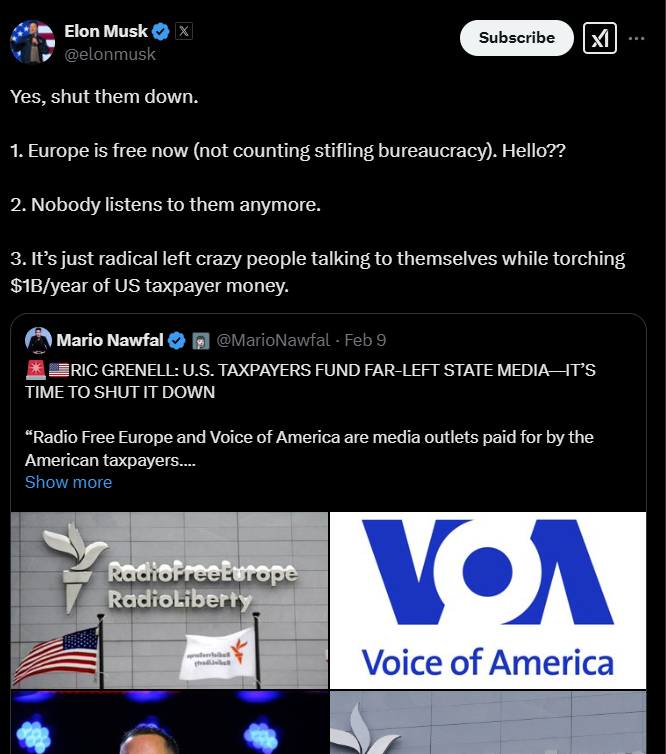In December, at the third People’s Kurultai, Kyrgyz President Sadyr Japarov criticized foreign funding of media and NGOs. He repeated complaints that media “spread false information, look for negativity, and undermine the reputation of others” and urged the U.S. State Department to directly fund the Kyrgyz government rather than media outlets or NGOs.
“If you don’t know where to spend money, give it to us, the state, directly. We will ensure democracy and human rights at the highest level,” Japarov said at the time.
Two months later, when Elon Musk took aim at RFE/RL and Voice of America on X, formerly Twitter, a journalist with Kabar, Kyrgyzstan’s state news agency, asked Japarov if it was just a coincidence, or if Musk had taken a page from Japarov’s book.
“It’s just a coincidence. Donald Trump and Elon Musk don’t need my initiatives,” Japarov offered.
On February 10, Musk – who heads the Department of Government Efficiency (DOGE, which is not actually a department) – retweeted Mario Nawfal, a 30-year-old “Twitter celebrity” who hosts a popular Twitter Spaces show. Nawfal’s post quoted Richard Grenell – himself a former diplomat, having served as U.S. ambassador to Germany in the first Trump administration, and now Special Presidential Envoy for Special Missions – as calling RFE/RL and Voice of America “state-owned media… filled with far left activists.”
“It’s a relic of the past. We don’t need government paid media outlets,” Grenell reportedly said.
Musk’s commentary took further aim: “Yes, shut them down.”

Source: X
In an interview on January 10 with Kabar – which is a state-owned media outlet and describes itself on its own about page as “the mouthpiece of state power” – Japarov had expressed support for the same idea.
“Earlier, 20-30 years ago, everyone waited for Azattyk, listened to it, and believed it. Because there was no internet back then, there were no smartphones. People don’t need Azattyk news now,” Japarov said, referring to RFE/RL’s Kyrgyz Service, Radio Azattyk.
Radio Free Europe/Radio Liberty (RFE/RL) is an American government-funded media organization that broadcasts news in 27 languages to 23 countries across Eastern Europe, Central Asia, the Caucasus, and the Middle East. The organization’s roots are in the ideological battleground of the Cold War, and it was funded covertly by the CIA until 1972. This is a history that RFE/RL’s foes have difficulty letting go of, despite considerable transparency regarding the organization’s funding.
At present, RFE/RL is a private nonprofit supervised by the U.S. Agency for Global Media (USAGM), which oversees all government-supported international broadcasting. Known until 2018 as the Broadcasting Board of Governors (BBG), USAGM is an independent agency. In the last decade, the organization has undergone structural changes – such as the shift in control from a strictly bipartisan board of directors to a single presidentially-appointed CEO – that have arguably eroded some of its independence.
In his first week in office, U.S. President Donald Trump nominated L. Brent Bozell, president of the conservative watchdog Media Research Center – the mission of which is to “counter leftist bias of the national news media” – to head USAGM. Trump also dismissed USAGM’s board, which is supposed to serve as the “firewall” between government funding and the independent work of the agency’s journalists, to shield them from political influence.
Importantly, RFE/RL characterizes its mission was providing “uncensored, trusted news to audiences in 23 countries where a free press is under threat.”
And contrary to Musk’s comment that “Nobody listens to them anymore,” 47.6 million people are reached weekly by RFE/RL’s coverage. According to USAGM’s own performance reports, the latest of which was published January 17, 2025, its audience has grown by 21 percent over the last four years.
Critically, RFE/RL produces media in local languages, supporting journalism that otherwise would not exist. Amid the difficult modern media ecosystem, funding is very much based on potential audience size.
At the same time, RFE/RL’s language services, particularly in Central Asia and Russia, have run deeply afoul of the region’s autocrats. RFE/RL was labeled an “undesirable organization” by Russian authorities in 2024.
And now the powers-that-be in Washington, elected and unelected alike, are parroting the same language.
“It’s just radical left crazy people talking to themselves while torching $1B/year of US taxpayer money,” Musk tweeted.
As with the wholesale deconstruction of the U.S. Agency for International Development, it’s not clear that the president – let alone Musk – can legally shut down USAGM, RFE/RL, or VOA with the stroke of a pen. All the same, as has been demonstrated by a flood of executive orders and emails in the first weeks of Trump’s second presidency, considerable chaos can be generated even without legal authority to follow-through.
The implications for Central Asia are serious. RFE/RL’s offerings are widely read and listened to, providing comprehensive coverage of serious local issues in local languages. Furthermore, dismantling the services would invariably affect the many other local media outlets that rely on RFE/RL’s work.
































